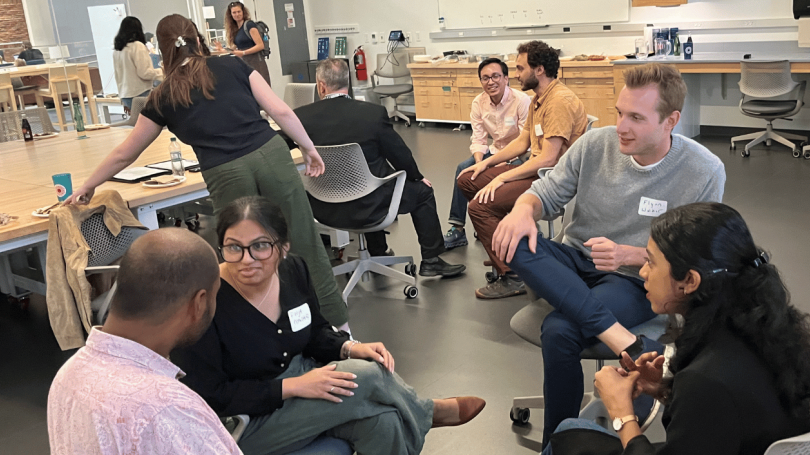
- About
- Education
- Research
- Engagement & Collaboration
- News & Events
Back to Top Nav
Back to Top Nav
Back to Top Nav
Back to Top Nav
The global challenge of decarbonizing energy systems is monumental, requiring not just technological breakthroughs but also collaboration across diverse fields and sectors. While this idea is simple in theory, bringing together different perspectives to work toward a unified goal is a complex task. It requires deliberate effort, persistence, and, most importantly, practice.
That's why the Arthur L. Irving Institute for Energy and Society at Dartmouth is taking a new step in its mission to foster interdisciplinary collaboration and accelerate the clean energy transition. This fall, the Institute launched its new Graduate Energy Fellows program, offering Dartmouth graduate students an opportunity to engage with one of the most pressing issues of our time: accelerating an affordable, reliable, and equitable clean energy transition.
"Graduate students are critical to the future of energy and climate solutions," said Geoff Parker, Interim Faculty Director at the Irving Institute. "Whether they pursue careers in academia, industry, government, or nonprofits, they'll be leading the charge in decarbonization and climate mitigation. We saw a strong interest in integrating energy and climate into their studies and other pursuits, which really fueled the momentum for this inaugural cohort."
Eighteen graduate students from across Dartmouth's Thayer School of Engineering, Tuck School of Business, Guarini School of Graduate and Advanced Studies, and Geisel School of Medicine have joined the program, representing a wide range of disciplines and research interests. The Fellows, spanning from first-year master's students to fourth-year PhDs, are united by their passion for clean energy and climate solutions.
For these students, the Graduate Energy Fellows program offers more than just a seat at the table — it gives them the chance to help shape the future of the program itself. "This is a pilot program," explained Megan Litwhiler, Manager of Academic Initiatives at the Irving Institute. "Fellows will not only engage with leaders and experts in the field but also play an active role in shaping how the program evolves. It's an exciting opportunity to create a lasting community of interdisciplinary thinkers who will drive innovation in energy and climate."
During the program's kickoff event in mid-September, Fellows broke into small groups to share what brought them to the program. Many, like one participant, found that they had been working in academic silos. "Connecting with other Fellows who are just as passionate about energy and climate has been invaluable," they said. "The program is a great way to break down those barriers and build a stronger community across Dartmouth."
Beyond networking and collaboration, the Graduate Energy Fellows program offers access to a host of resources. Over the 2024-2025 academic year, Fellows will connect with visiting experts, receive funding to attend conferences, and gain mentorship from Dartmouth faculty and alumni. They will also work together on multidisciplinary projects, giving them hands-on experience in wrestling with the challenges of the clean energy transition.
"We're thrilled to be working with such a talented group of students," said Dr. Litwhiler. "This is just the beginning of a journey that we hope will not only shape the future of the Institute but also advance progress in the energy transition."
As the Irving Institute welcomes its inaugural cohort of Graduate Energy Fellows, it marks the beginning of an exciting new chapter — one where graduate students from diverse disciplines will be an integral part of the Institute community and its mission to help shift society toward a more sustainable energy future.
Learn more about the 2024-2025 Irving Institute Graduate Energy Fellows.